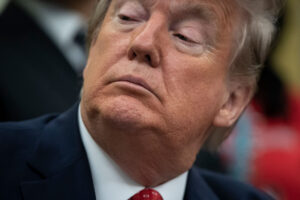Trump Wants To Use Executive Privilege To Hide His Crimes. Again.
Play stupid games, win stupid prizes.

(Photo by Drew Angerer/Getty Images)
Donald Trump’s fight to use executive privilege to shield himself from potential criminal prosecution entered a new front this week as multiple media outlets sued in the federal court in DC to unseal documents from the grand jury investigating the January 6, 2021 Capitol Riot.
On October 18, Politico’s Kyle Cheney sent a letter to Chief US District Judge Beryl Howell requesting that she unseal information about two pending grand jury matters:

Law Firm Business Development Is More Than Relationship Building
Sitting sealed on this court’s docket, in 1:22-gj-00025, is a historic ruling that bears on the ability of former presidents to control, and even silence, ex-advisers in matters of urgent national significance. The privilege issues touched upon by your September 28, 2022 ruling may alter the balance of power in unpredictable ways and bear on the ongoing grand jury proceedings stemming from the January 6, 2021 attack on the Capitol.
It’s clear from contemporaneous reporting that this is a reference to testimony by Mike Pence’s former aides Greg Jacob and Marc Short to the federal grand jury empaneled to investigate the events of January 6, 2021. For instance on September 22, CNN, the undisputed king of DC courthouse stakeouts, spotted Trump’s lawyers Evan Corcoran, Tim Parlatore, and John Rowley leaving the January 6 grand jury. The network reported that Trump’s lawyers were there to litigate executive privileged claims asserted by the former president over the wishes of the incumbent.
The New York Times documented some of the disputes over privilege between Trump’s personal attorneys and his former White House lawyers. Memorably, Eric Herschmann told Corcoran and Rowley that he wasn’t going to invoke executive privilege sua sponte, and they were going to have to go to court and make the case themselves. According to the Times, Corcoran was sure that some unidentified “chief judge” would validate any privilege claim Team Trump put forward, but Herschmann wasn’t willing to roll the dice.
“I certainly am not relying on any legal analysis from either of you or Boris who — to be clear — I think is an idiot,” he said, referring to Trump’s in-house consigliere Boris Epshteyn, who recently got his phone seized by the FBI and participated in some mind-numbingly stupid email exchanges with the team plotting the fake electors coup.
Sponsored


Generative AI at Work: Boosting e-Discovery Efficiency for Corporate Legal Teams

Happy Lawyers, Better Results The Key To Thriving In Tough Times

Happy Lawyers, Better Results The Key To Thriving In Tough Times
Weeks later, the Washington Post revealed that Judge Howell had refused to sustain Trump’s privilege claim, and that the DC Circuit had similarly refused to block the aides’ testimony.
“It’s hard to imagine a weightier constitutional question for the courts to decide than the interplay between current and former presidents on matters of executive privilege that may bear on national security,” Cheney wrote, adding later, “It’s also hard to imagine a matter of more intense public interest than understanding the scope of a former president’s powers, particularly when that former president is facing questions about his role in fomenting an attack on a coequal branch of government.”
In fact, we know quite a bit about Trump’s fight to invoke privilege in the January 6 case from public reporting, as the New York Times and reporter Charlie Savage laid out yesterday in an application to unseal “materials regarding the scope of executive privilege invoked by former President Donald J. Trump or former Trump Administration officials, redacted to remove factual material that is properly subject to secrecy under Rule 6(e) of the Federal Rules of Criminal Procedure.”
As the motion makes clear, the media outlets are not seeking the substance of grand jury testimony. Rather they are asserting a public interest in the legal dispute over executive privilege, particularly as “the privilege invoked by a former president lacks the support of a current president and raises novel constitutional issues.”
As set forth below, it has become public knowledge that such privilege assertions have been made in motion practice ancillary to a grand jury investigation. Because this legal issue—among others, perhaps—is distinct from the proceedings before the grand jury, this Court has discretion pursuant to Local Criminal Rule 6.1 to unseal the relevant documents, at least in part. […] Given the profound national interest in the purely legal issues being resolved through these judicial documents, The Times respectfully requests that the Court exercise its discretion to unseal redacted versions of any rulings by the Court, motions briefing, or hearing transcripts related to the privilege issue.
Sponsored

Law Firm Business Development Is More Than Relationship Building

Curbing Client And Talent Loss With Productivity Tech
It’s worth noting that, while the dispute over Trump retaining classified documents is factually unrelated to the January 6 grand jury, both cases involve Trump making a post-presidential privilege invocation, against the wishes of the incumbent president, and in an apparent attempt to shield himself from either bad publicity or criminal prosecution.
All of which is, not to put too fine a point on it, batshit crazy. So, yeah, it does seem like the public has an interest in seeing how this particular bit of sausage is getting made.
APPLICATION OF THE NEW YORK TIMES COMPANY AND CHARLIE SAVAGE FOR ACCESS TO CERTAIN DOCKETS, ORDERS, LEGAL BRIEFING, AND ARGUMENT TRANSCRIPTS ANCILLARY TO JANUARY 6 GRAND JURY PROCEEDINGS [Docket via Court Listener]
Liz Dye lives in Baltimore where she writes about law and politics.







